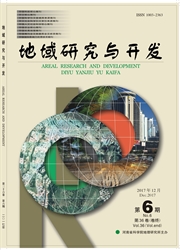

 中文摘要:
中文摘要:
通过探索性空间分析检验中国地级市新型城镇化各指数存在的空间自相关性,并利用空间误差模型及其稳健性分析对新型城镇化质量、效率与城乡协调指数的影响因素进行案例探讨。结果显示:新型城镇化的质量、效率与城乡协调指数均存在空间自相关性。产业结构对城镇化发展质量具有正向促进作用,而与城镇化效率、城乡协调指数的关系则恰好相反;基础设施建设和土地规模有助于提高城镇化的质量与效率,但却抑制城乡之间的协调发展。整体来看,工业化的发展、基础设施的完善以及土地的规模效应有助于新型城镇化的发展。
 英文摘要:
英文摘要:
The spatial autocorrelation of new urbanization in prefecture-level cities of China was estimated with exploratory spatial data analysis, what' s more, using the spatial error model to empirically analyze the factors on their quality, efficiency and coordination index. The results show that there is a spatial autocorrelation in quality, coordina- tion and efficiency of new urbanization. Among them, the industrial structure has a positive effect on the index of ur- ban quality, but opposite for the index of urban efficiency and coordination. In addition, infrastructure will improve the index of urban quality and efficiency, but inhibit coordinated development between urban and rural area. On the whole, due to industrialization, infrastructure and land scale, the new urbanization will develop more higher.
 同期刊论文项目
同期刊论文项目
 同项目期刊论文
同项目期刊论文
 期刊信息
期刊信息
